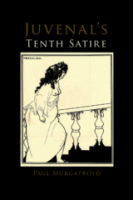
Liverpool (2017) h/b 257pp £80 (ISBN 9781786940698)
This would be a very good book to put into the hands of somebody who is coming to the text of Juvenal for the first time and wants to see what all the fuss is about. M. tells us that this book is aimed at ‘senior undergraduates and above’, but in fact his language is at all times accessible to anybody with an interest in the subject-matter—all Latin is well translated into fluent English and the author’s style can even be chatty and light-hearted to suit the highly unsolemn nature of some of the Latin under discussion. M. tells us that this is ‘not a commentary’, although it certainly does much of the work of a literary commentary in that it explains and unpacks the literary style and the meaning in a sequential form of discussion. M. describes it as ‘one man’s close reading of X as poetry’ and it comes across as a monograph whose thesis is something like: ‘Reasons to read Satire X.’ His conclusion is that Juvenal is ‘an accomplished poet and provocative satirist’ and he seeks above all to show the intelligence, wit and genuine human emotion at work behind the satire. This is an objective which he fulfils extremely well.
The Tenth Satire is written in the form of a priamel, examining a range of things which people tend to pray for (and dismissing each of them in turn as in fact not worth having), before giving his own recommended prayer—for health and fortitude—and leaving the reader oddly uplifted by the thought that perhaps not being great/long-lived/lovely is in fact better than being any sort of celebrity. The old bitter underdog of Satires 1-5 has been replaced with a more resigned philosophical man who is content to be unexceptional. M. follows the line of Juvenal’s argument and devotes separate chapters to each of: Power, Eloquence, Military Glory, Longevity and Beauty, and the book ends with a final chapter which looks in much shorter form at the other two satires in Book IV and showing how they fit into the pattern of thought set out in poem 10.
I have a few quibbles with the end-product: the text printed is that of Housman and (fine though that is) this ignores the huge amount of work done on the text in the last century. I would have preferred to read the text of (say) Clausen, Braund or Willis. Textual discussion is minimal: that famous line 356—orandum est ut sit mens sana in corpore sano—for instance has been suspected as an interpolation by Reeve (CR (1970) 134-6) and yet this is not even discussed. Other textual cruces are relegated to references to other authors in footnotes. Historical matters are similarly handled with brief explanation in the text supported by references in footnotes to the ancient evidence (see e.g. his handling of the death of Demosthenes [p. 76 with notes 24 and 25]). The question of the ‘sources’ of the satire—in terms of which (if any) philosophical school inspires the thinking—is covered in ten brisk early pages (9-18) and would perhaps have been better as an appendix after the poem has been examined on its own merits: the echoes, for example, of Horace Odes 1.31 make more sense when we have read what Juvenal did with the motifs rather than reading Horace first and then hoping that the reader will recall this many pages later.
These quibbles do not detract from the many obvious virtues of this book, and my initial misgivings (is it a commentary? if not, what is it?) melted away as M. took me through the text of this fine poem and allowed the Roman to speak for himself with M. as his able interpreter. My final quibble is also a prejudice alert: my own edition of this same text (with commentary) was published by the same publishing house a matter of a few months before M. and yet neither of us had any idea what the other was up to and I only wish I had had access to this book when I was writing my own as he has a wealth of excellent ideas which would have helped me to form my own. There is a good-sized bibliography and a general index (but no index locorum), and the book is excellently proof-read and produced.
John Godwin
